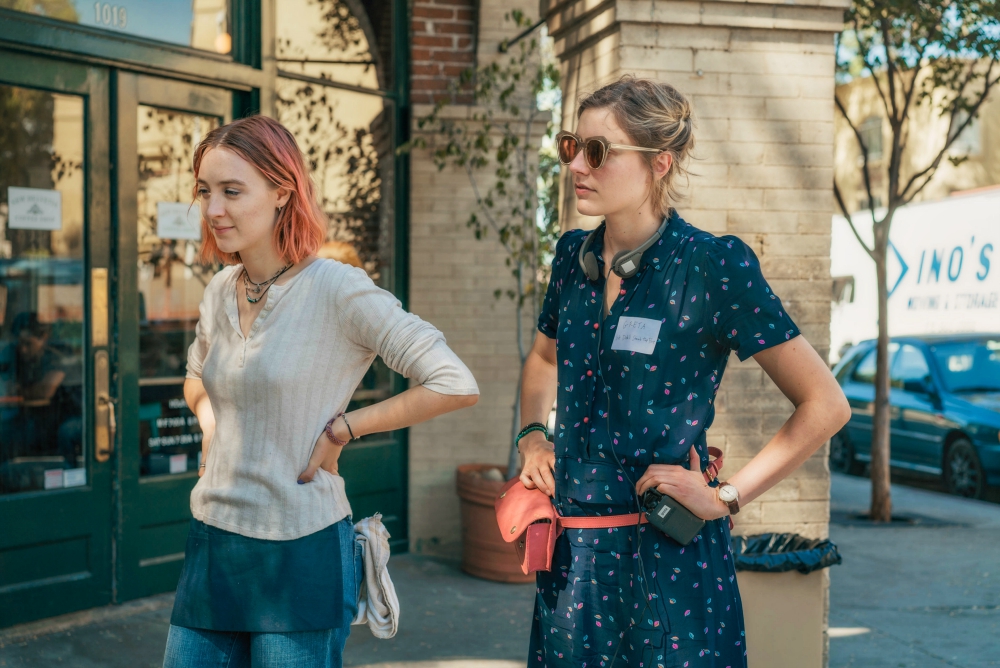
Saoirse Ronan and Greta Gerwig star in a scene from the Oscar-nominated movie "Lady Bird." (CNS/A24)
I watched about 85 films in 2017. It was an exceptionally good year for cinema. History, humanity, humor, family, religion, identity, relationships and the environment are just a few of the themes of films nominated in the Academy Awards' Best Picture category.
Overshadowing the Oscars this year is the "#MeToo" movement against sexual harassment, and the violence of yet more school shootings and death. Three of the Oscar-nominated films in the Best Picture category deal directly or indirectly with war. The violence in "Three Billboards Outside Ebbing, Missouri" only makes sense in the context of the characters' spiritual poverty and pain. The cruel violence in "The Shape of Water" is fueled by bias and ego but countered by love.
Unfortunately, it's time to take out and rewatch Michael Moore's 2002 Oscar-winning documentary "Bowling for Columbine." On second thought, make it a double feature and watch, perhaps for the first time, his mostly ignored 2015 gem, "Where to Invade Next," for some ever-so-obvious solutions to America's problems, including guns and a broken penal system.
In addition to Greta Gerwig, several notable women directors released films in 2017 but were ignored by the Academy: Niki Caro, Kathryn Bigelow, Patty Jenkins, Sofia Coppola, Eleanor Coppola, Amma Asante, Valerie Faris, Amanda Lipitz and Dee Rees, to name a few. Skipping Jenkins and Rees gets a scold from me.
Best Picture
♦ "Call Me by Your Name" is a coming-of-age story based on André Aciman's 2007 novel. The Perlmans are a Jewish American family living in northern Italy. The father (Michael Stuhlbarg) is an archeologist who each summer welcomes a grad student to assist him.
This summer, it is 24-year-old Oliver (Armie Hammer). Elio (Timothée Chalamet), the brilliant 17-year-old son, has to give up his room for Oliver and at first resents him. But over the summer, they are increasingly attracted to one another. They have a brief affair even while going out with girls. Mr. Perlman and his wife (Amira Casar) notice Elio's attraction to Oliver and encourage the two to go to Bergamo for three days before Oliver must return to the States.
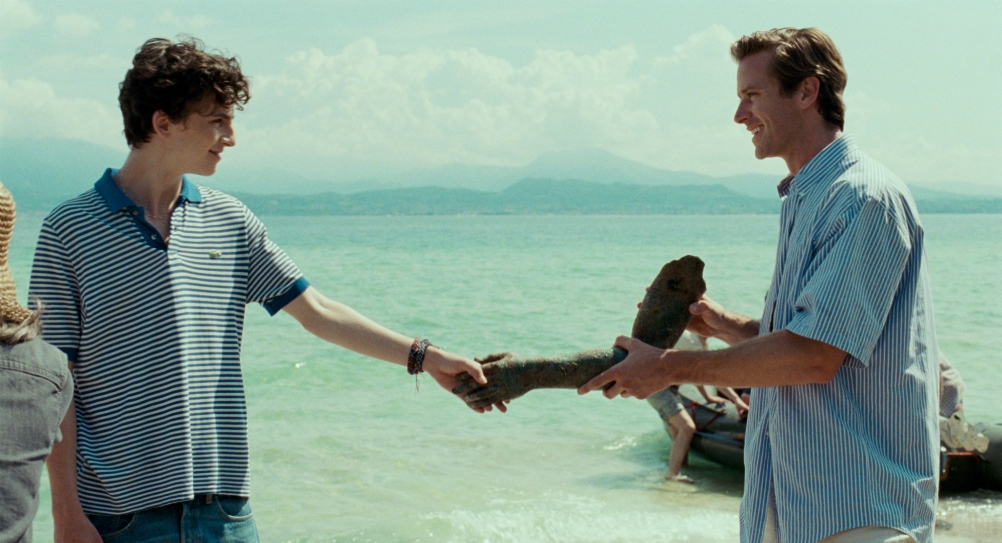
Timothée Chalamet and Armie Hammer in "Call Me by Your Name" (Sony Pictures Classics/Sayombhu Mukdeeprom)
This is a finely wrought story of forbidden attraction with a gentle and surprising ending that reveals a father's love and elicits empathy and understanding from the audience. I wasn't expecting that.
♦ "Darkest Hour," directed by Joe Wright, gets off to a slow, detailed, tortuous start with the British government in turmoil over the rise and aggression of Hitler, the resignation of the appeasement Prime Minister Neville Chamberlain (Ronald Pickup) and the selection of Winston Churchill (Gary Oldman) to replace him.
Once Churchill takes over and forms a new government, the film starts to pick up, leading to the evacuation of British forces from Dunkirk and Churchill's rousing determination to fight the Nazis at any cost.
Churchill is known for never taking the Underground but one day is forced to do so. He decides to converse with ordinary citizens and is transformed by their love of country. This scene is moving and Oldman's performance is generous and compelling.
♦ "Dunkirk" is written and directed by one of my favorite directors, Christopher Nolan. However, I don't support this film in the Best Picture category because it is not fully realized. I never became invested in any of the characters. The 1942 film "Mrs. Miniver" told the story of the evacuation in much more moving, personal terms.
This version is too detached because it never gets "close" to the soldiers' experience or that of the courage of the small boat owners; it's like looking at the whole operation from a helicopter, and then only a small part of it. However, for this same reason, I would support "Dunkirk" in the Best Cinematography category.
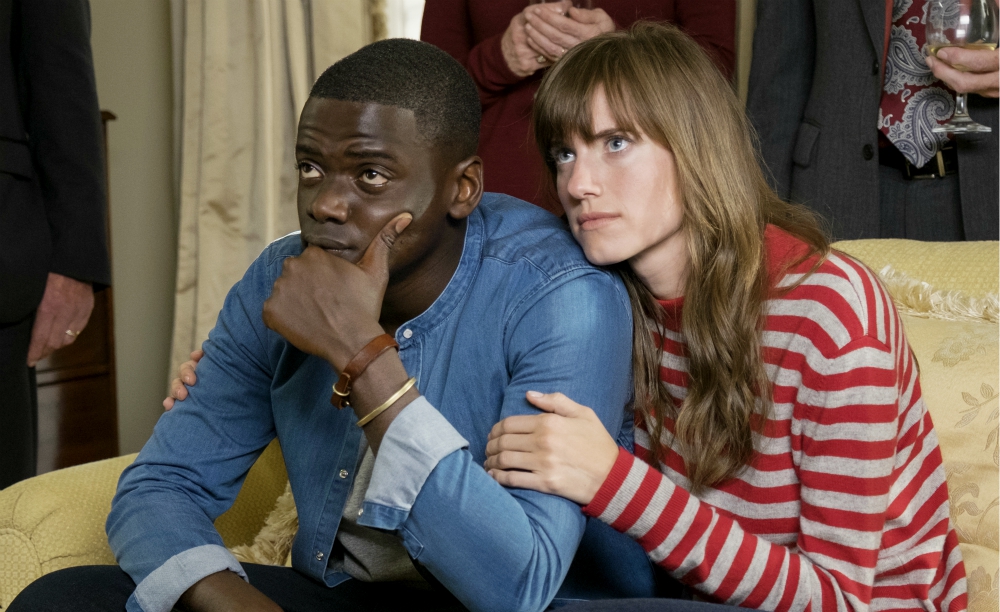
Daniel Kaluuya and Allison Williams in "Get Out" (CNS/Universal)
♦ "Get Out" is an outstanding film, and first-time director Jordan Peele has the intelligence of a brain surgeon and the magical skill of a gifted, longtime filmmaker. The African-American director made me, a white person, feel what it might be like to be black in America in the psychological horror story.
Chris Washington (Daniel Kaluuya), who is black, travels with his white girlfriend Rose Armitage (Allison Williams) to spend the weekend with her parents (Bradley Whitford and Catherine Keener) at their remote country estate. Rose doesn't tell them that Chris is black and he, it turns out, is justifiably nervous.
Soon after their arrival, Chris meets the strange black servants and Mrs. Armitage plays with his mind at midnight. At a surreal gathering of friends the next day, things get creepier. Chris' friend Rod (LilRel Howery) adds comic relief. That's all I can say, except this is one thriller that is relevant, worth seeing and Oscar-worthy.
♦ "Lady Bird" is writer/director Gerwig's homage to her days at an all-girls Catholic high school in her hometown of Sacramento, California. Although not a Catholic, Gerwig effectively captures her experience, the cultural mores of a Catholic school, and the complexities and pain of adolescence in this engaging drama with remarkable comedic moments. The story never goes overboard or mocks its subject.
Saoirse Ronan is Christine, who names herself "Lady Bird." Laurie Metcalf plays her mother, Marion. Tracy Letts is her dad, and Jordan Rodrigues is her adopted brother, Miguel (whose college entry form gets one of the biggest laughs in the film). A special nod goes to Lois Smith as Sister Sarah Joan. I interviewed her and she was as delighted to have played a nun as I was with her heartfelt performance.
"Lady Bird" is one of the best portraits of a Catholic school experience that I have seen. It is organic and authentic. While Marion's limp advice regarding sexual activity may disappoint, Lady Bird's search for God and meaning will inspire.
Advertisement
♦ "Phantom Thread" stars Daniel Day-Lewis in what he says will be his final performance. Truth be told, his performance as Reynolds, the aging, solitary tailor, and that of Vicky Krieps as Alma, the waitress he engages as his muse and fashion model, are both excellent. It is director Paul Thomas Anderson's screenplay that is wanting.
This is a character study and love story about two fictional crazy people or two people crazy in love who do crazy things in an elegant British setting. We get "crazy" on the news every day; I am sorry I had to pay for it. I would be astonished if the film wins an Oscar or Day-Lewis wins best actor.
The film's trailer offers a false promise of what the hidden, or ghostly, thread really means. Maybe it was supposed to derail our expectations and tie our search for the film's meaning in knots. I don't know. I don't care.
♦ "The Post" is an important, relevant story. It's about the decision by Washington Post publisher Katharine Graham (Meryl Streep) to publish the now-infamous Pentagon Papers after the Department of Justice told The New York Times to cease and desist from running the report. Directed by Steven Spielberg, the story is told in a conventional way, the build-up of tension and drama well-paced, showcasing both Graham's role in a world dominated by men and the importance of a free press. Tom Hanks plays famed editor Ben Bradlee.
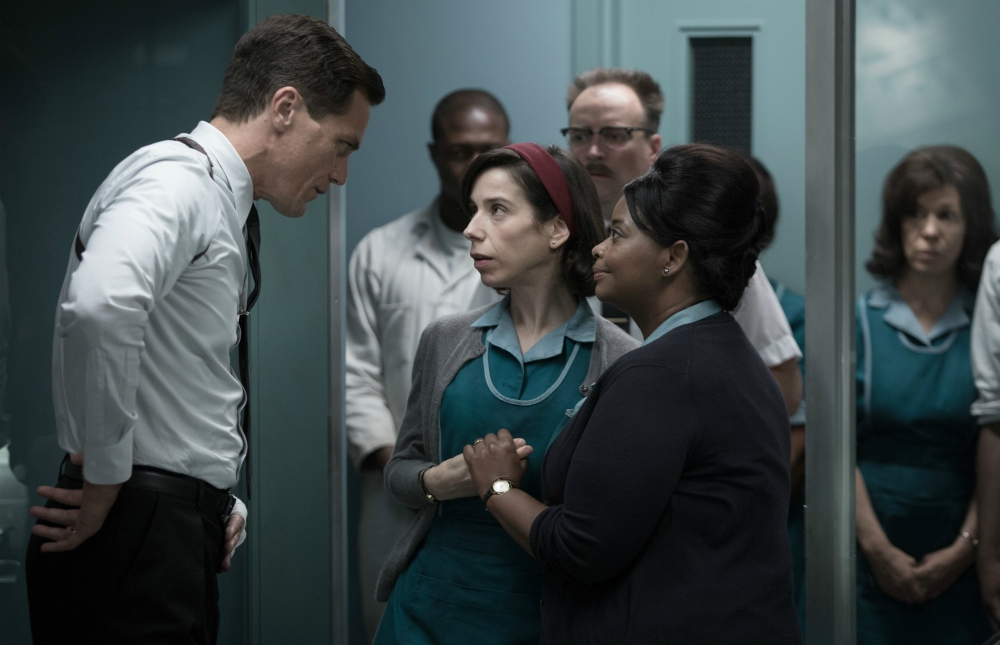
Michael Shannon, Sally Hawkins and Octavia Spencer in "The Shape of Water" (CNS/Fox)
♦ "The Shape of Water" is way more than it appears to be. At first bored, I restarted watching from the beginning after a break of two days. Guillermo Del Toro and Vanessa Taylor's script is at once complicated and unique: It's a retro science fiction drama that manages to make us care about the mute Elisa (Sally Hawkins), who hates the lime Jell-O pie that her landlord Giles (Richard Jenkins) keeps giving her but consumes endless hardboiled eggs, a source of protein that she shares with the Amphibian Man/the Asset (Doug Jones).
The Amphibian Man was captured in the Amazon and the 1960s U.S. government wants to use him in its space program. Col. Strickland (Michael Shannon) is the inhuman agent in charge of the "the Asset" that Elisa and Zelda (Octavia Spencer) must outsmart.
Elisa's backstory is important to the relationship that she develops with the Amphibian Man. There is a lot to talk about here, including the biblical references. It is a deserving film but it is somewhat overwrought, as if Del Toro is trying too hard.
♦ "Three Billboards Outside Ebbing, Missouri" is my favorite film of the year. If you read my rather effusive review, you'll know why I think it deserves every Oscar for which it is justly nominated.
I detested Dixon, Sam Rockwell's redneck racist cop character — and by the end I loved him. My heart broke for Frances McDormand's Mildred, the mother of a daughter who was raped and murdered and whose case never solved. Woody Harrelson as the dying sheriff is brilliant in this Flannery O'Connor-esque story that reveals grace among the mysteries of suffering and human relationships.
I'm sorry director Martin McDonagh was not nominated for Best Director, because he surely deserves it.
My honorable mentions:
"The Florida Project" deserved a Best Picture nomination. It is relevant, warm and human with excellent performances. Yes, I liked Willem Dafoe's performance, but the show-stealer is Brooklynn Prince as the 6-year-old Moonee who is already too old for her years.
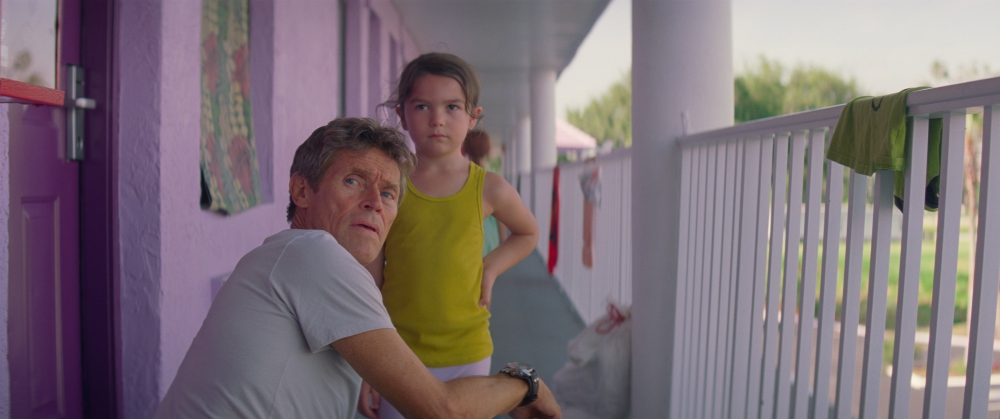
Willem Dafoe and Brooklynn Prince in "The Florida Project" (CNS/A24)
"The Greatest Showman" only received one Oscar nod, for Original Song, but it deserved so much more. It is a thoroughly enjoyable musical and the entire cast, led by Hugh Jackman, gives memorable performances. I loved it. I mean, these people can sing and dance, unlike the rather tentative performances of last year's musical du jour, "La La Land."
"The Big Sick" is a touching, based-on-a-true story about the immigrant experience that focuses on a Pakistani man (Kumail Nanjiani) who wants to be a stand-up comedian and the American (white) girl (Emily V. Gordon) who loves him. Great comedy, pathos and drama.
"I, Tonya" gets a nod from me for Allison Janney's performance, but the film as a whole was just sad to me. I recall the entire saga of Tonya Harding's husband and the arrangement with a hired thug to attack Nancy Kerrigan so Tonya would medal at the World Championships and then the Olympics. Yes, I felt sorry for her then and admire her scrappy personality that Margot Robbie plays well enough. McKenna Grace's performance as the young Tonya broke my heart, though.
"Coco" and "The Breadwinner" tie for the Best Animated Feature for me; I loved both of them. The song "Remember Me" from "Coco" rivals "This Is Me" from "The Greatest Showman."
The left-outs
Someone has to give a shout out to Richard Gere's two performances in 2017 that surely deserved award recognition. In "Norman," he plays a lonely Jewish "fixer," and in "The Dinner," he is a senator whose conscience cannot stand up to the women in his life. Both films were complex, original stories and Gere simply excelled.
Harrelson's nuanced performance as the loving but lacking father in the based-on-a-true story "The Glass Castle" was exceptional.
I would like to scold the Academy for ignoring Bigelow's bold and relevant retelling of the 1967 race riots ignited by the police depicted in "Detroit." At the very least, it deserved mention for film and sound editing.
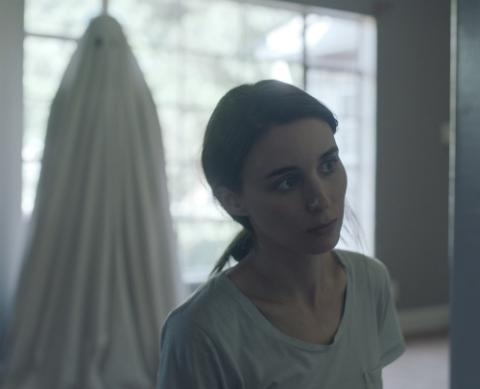
Rooney Mara in "A Ghost Story" (CNS/A24)
I wish the deeply moving and deserving "Cries From Syria" had been nominated in the documentary category, along with "Bending the Arc" about people who are genuinely trying to heal the sick and forgotten of this world.
"A Ghost Story" for originality alone deserves recognition. Do you ever think about who lived in your house before, or on the land on which our house stands? What happens to love after death?
Alexander Payne's "Downsizing" surely demanded some consideration from Academy members if they actually watched the film; I liked it very much because of its anti-"Benedict Option" approach to transforming in the world. Well-acted, interesting and imaginative with a bold premise. Hong Chau's performance as the maimed Vietnamese activist and kind humanitarian was deeply felt and deserved recognition.
Other films that had something to say and a story to tell but didn't quite reach the Oscar bar were:
- "The Promise" about the Armenian genocide;
- Eleanor Coppola's gentle "Paris Can Wait" about a giving, lonely woman with a hidden, grieving heart;
- "Wonderstruck," based on the novel by Brian Selznick, was a highly original story about longing for connection and family;
- "An Inconvenient Sequel: Truth to Power" deserved more love than it got but it kind of overdosed on Al Gore;
- "Wind River" for its revelation about missing Native American women from reservations whose cases are never solved;
- "Logan Lucky" for its heart — it was just funny and I have no idea what it was really about;
- "A United Kingdom" about an interracial marriage in colonial Africa that the British could not abide but whose interference the couple overcame;
- "The Man Who Invented Christmas," about Charles Dickens' case of writer's block that led to A Christmas Carol, was enjoyable and could easily become a Christmas classic;
- "The Zookeeper's Wife" was better the second time around.
[Sr. Rose Pacatte, a member of the Daughters of St. Paul, is the director of the Pauline Center for Media Studies in Los Angeles.]








